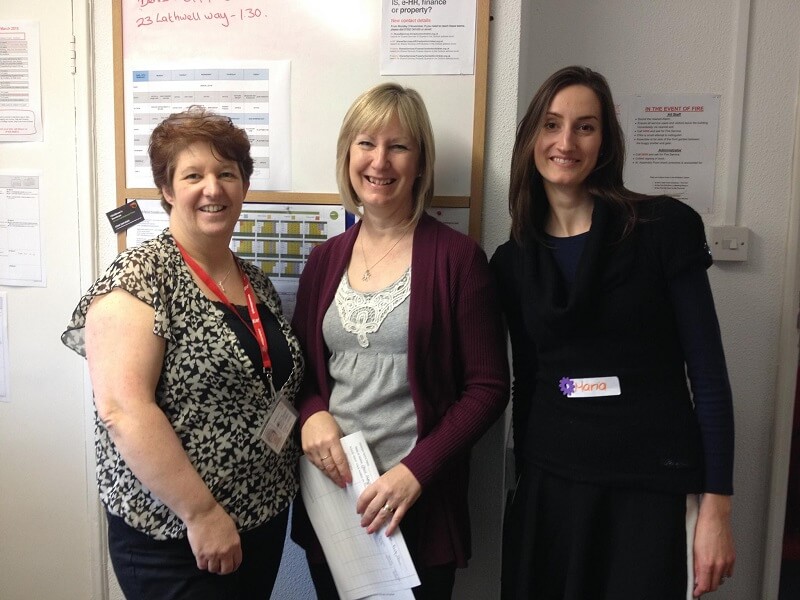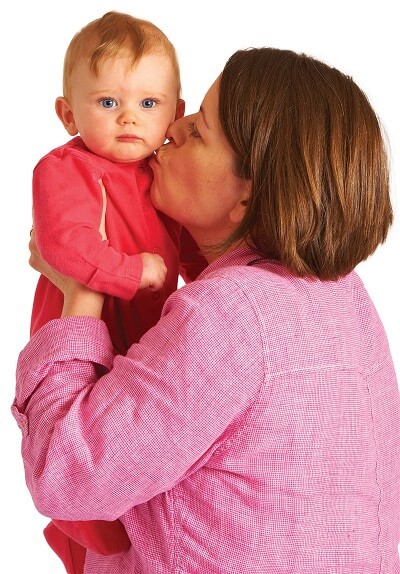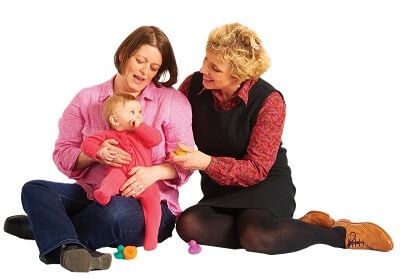PND Support – An Interview With Our CEO
Home is where the heart is. For more than 30 years, our local charity has been providing practical and emotional support. Uniquely, helping thousands of children and their families throughout Bedfordshire. Home-Start believes that every child deserves a safe place to live and play. Equally important is protection from the effects of poor physical and mental health.

Linda our CEO with Alison and Maria from the Leighton Buzzard Children’s Centre
where we hold one of our PND Support Groups.
We asked Linda Johnson, our Dunstable charity’s CEO, to give her insights on providing PND support to mothers in Bedfordshire.
Linda, how long has Home-Start Central Bedfordshire provided PND Support?
“In the 31 years that our charity has been going, we’ve supported women with PND through our home visiting volunteers. Studies show that the support of a caring friend and someone to regularly listen can be very helpful for women with postnatal depression.
“About 5 years ago we were really pleased to begin running PND Support Groups as well as our home visiting programme; we call these the Great Expectations Groups. Una (our GEG Co-ordinator) decided on this name because often we become a parent with great expectations of what it will be like, but the reality for one reason or another is different. I’ve often heard women who in their working life have successfully managed an office but find that “managing” a baby is so much harder at times! Nothing quite prepares you for the sheer exhaustion and the life change experience of having a baby, especially your first child.”

Our PND Support Groups are now closed due to cuts in government funding.
However, we continue to provide PND support through our home visiting service.
Why do women suffer from PND? Are there any reasons in particular?
“Around 1 in 10 mothers experience postnatal depression, it is very common but not so often talked about. There are many reasons why this can happen including hormonal changes but of course that’s not all of it. Having a baby can be a huge life change! Sleep deprivation is also a well known form of torture, a lot of babies appear not to have read the baby books and don’t sleep as they are supposed to.
“Because of every persons unique situation, there are possibly as many reasons for postnatal depression as there are sufferers. There is and probably always will be sufferers of PND. It is a common illness and that’s why it’s so crucial that there are always organisations like us around to help.”

Home-Start Central Bedfordshire is one BIG family. We empower local parents to
support one another so that we can all build better lives for our children.
What should you do if you think you are suffering from PND?
“Speak to your doctor or Health Visitor and take their advice. Don’t think that you are failing, it is an illness like any other. The GP may offer you antidepressants which can be helpful and there are some that you can take if you are breastfeeding. You may also be offered talking therapies such as CBT (cognitive behavioural therapy) which can also be really beneficial. Speak to your partner or your family or a good friend, it is very important that you get some support.
“Try to eat healthily, do some exercise, get some sleep if you can. Go for regular walks with your baby in the fresh air and the daylight and exercise can help in lifting your mood. The temptation when you are feeling depressed can be to hide away in the house.
“Come to one of our groups if you live in Central Bedfordshire. You can ring up, get a friend to ring us on your behalf or send an email and we’ll get back to you. You don’t need to get referred from your GP or health professional to join our PND Support Groups.”
Why do people come to the groups?
“You can go to some parent and toddler groups and come away feeling more lonely than you did when you came in – we make a real effort to make sure you feel welcome! At our groups there is no obligation to do anything if you don’t want to; you can just come and be yourself.
“People visit our groups to know that they’re not alone because depression can be very isolating, and you may feel like you are the only person who feels this way. Someone in one of the groups recently said that it’s a relief not to have to pretend that everything is fine. Our groups are a safe space where you can feel free to participate as much or as little as you like. We have space for the children to play (if you have young children), we have tea and coffee & cake. It’s a chance to talk about how you feel if you want to with people who understand. Each week we explore different things that can help, for example we recently looked at Mindfulness. It may sound strange to some people but although sometimes women cry we also laugh, we take a very positive spin on dealing with a very sensitive issue.”
What have you been exploring recently at the PND Groups?
“Being a perfect parent – we talked about how the media portrays parenthood. Is there such a thing as a perfect parent? The general conclusion was that the perfect parent does not exist. We felt that sometimes you don’t notice the pressure that parents are under from the media including social media, it can be very subliminal. As a lot of women these days are returning to work, there can be double pressure on mothers to be the perfect employee at work and the perfect parent at home.
“What strengths do we have? – when you’re feeling depressed you can feel like you have very few positive things to say about yourself. Some sufferers may focus on the negatives, so we explored what our personal strengths are. We also looked at how to move forward with what we wanted to do with action planning. For example some of us wanted to move home, others simply wanted to make new friends; we looked at positive ways to move towards achieving those goals.
“Mindfulness – we spent a few weeks on this topic exploring ways of practising being in the moment right now rather than looking too far into the future. We looked at worry and anxiety and learnt techniques such as the ‘worry half hour’, ‘worry boxes’ and ‘worry trees’.
“CBT – We had an NHS funded organisation called the Bedfordshire Mental Health and Well Being Service come into run 4 sessions. We are looking forward to working with them more in the future.”
How is Home-Start Central Bedfordshire qualified to offer support?
“Our group facilitator has many years of experience working in mental health and our charity has 31 years experience working with local mothers with ill health. The ‘All Our Children Manifesto’ was launched by Home-Start last year. In this manifesto we state that ‘we believe all our children should grow up with support when their parents suffer with mental ill health.’ As a Family & Children’s Charity we want to do all we can to help mothers who are suffering from postnatal depression.”
Do you get a lot of women coming to the groups?
“The average size of a group is about six and we have five groups around the county, they are run fortnightly and last for 2 hours.”
Are the groups successful?
“Attendees say it is really helpful, it is a relief to be there and to be around other women who understand. People form a lot of friendships and many have gone on to meet up outside these groups.
“Some people aren’t at the point where they feel they can cope with a group; so for them a home visiting volunteer is better suited who may then accompany them to the group later on if they would like to go. Some of our volunteers have experienced postnatal depression themselves so can relate to sufferers. Having someone non-judgemental to listen can be very helpful, our volunteers listen to your feelings and do not judge.”
Why do you think PND Support is so important for sufferers?
“PND is a real diagnosable condition, as with any illness you need to get help. Fortunately help is increasingly becoming available for sufferers here in the UK. PND can not only affect the sufferer but the whole family. It is important for organisations like us to not only offer support but also tackle the stigma surrounding what is a very common condition.”
Are there any other PND charities that you recommend for support?
“I recommend MIND, they are the UK’s largest mental health charity. They have a wealth of resources on their website and I’m looking forward to meeting with them soon to explore ways that we can work together.”
